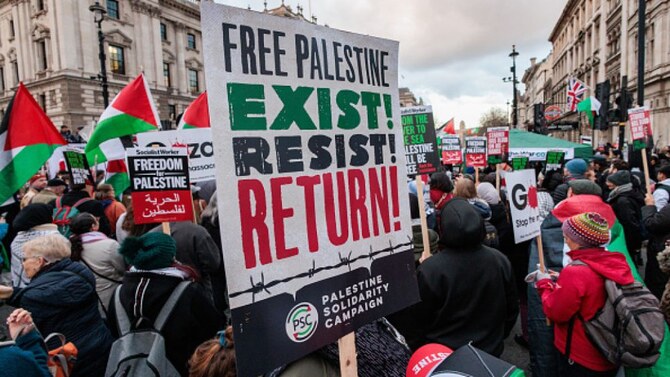LONDON: The Coalition to Defend Freedom of Expression in Lebanon denounced on Wednesday the instances over the past two weeks in which authorities had summoned journalists for investigation.
The media watchdog believes the moves aim to stifle freedom of expression, according to a statement published by Amnesty International, a member of the coalition.
The Council of the Beirut Bar Association, as per the statement, issued on March 3 a decision to amend Articles 39 to 42 of Chapter Six of the Lawyers’ Code of Ethics.
The amendments seek to regulate lawyers’ relationship with media outlets, requiring the former to obtain permission from the head of the Bar Association to participate in legal seminars, conferences, interviews, discussions with media outlets, social media platforms, websites, and groups.
Nizar Saghieh, the executive director of The Legal Agenda, a nonprofit research and advocacy organization, was summoned in the wake of the decision by the Bar Association to a hearing without being informed of the reasons.
Head of the Beirut Bar Association Nader Gaspard said during a media-focused seminar on March 31 that the rising number of social media platforms had created “chaos and confusion” about “which court has jurisdiction to look into cases of defamation, libel, slander, insults and fake news, the Court of Publications or the Criminal Court.”
He announced the formation of an in-house Media Committee “to examine draft laws appropriate for the current developments and technologies,” the statement read, and called for the introduction of new legislation defining what constitutes a social media outlet, types of platforms and their function, and the conditions of their use.
The coalition said in its statement: “This new and troubling trend pursued by the Bar Association to restrict the freedoms of registered lawyers coincides with another trend that the groups of the coalition have been documenting for years, and which the authorities recently escalated, to restrict the freedom of the press.”
The coalition pointed out in its statement that powerful Lebanese political and judicial figures had in the past week resorted to criminal defamation laws “to silence criticism,” highlighting that “public prosecutors also summoned journalists for interrogation at security agencies, in violation of the Publications Law.”
Among those summoned was editor-in-chief of the Public Source website, Lara Bitar, who was the target of a complaint by the Lebanese Forces over an article about toxic waste.
The co-founder of Megaphone, Jean Kassir, was called to questioning on March 30, a day before Bitar’s summoning, without being informed of the reasons, an act described by Amnesty International as “an intimidation tactic.”
Megaphone linked the summons to an article it published earlier in March, headlined “Lebanon ruled by fugitives from justice.” The piece named Ghassan Oueidat, the public prosecutor at the Court of Cassation, among several officials accused of “various crimes ranging from looting public money and illegal enrichment to obstructing the law.”
The Coalition to Defend Freedom of Expression said: “We are alarmed and worried about the direction that the Bar Association has recently taken and about the summons targeting journalists, as such actions increase the restrictions on freedom of expression and freedom of the press in the midst of an escalation in the use of criminal defamation provisions, violating international standards.”
The coalition called on the Lebanese authorities and the Bar Association to “respect the protections guaranteed in the constitution and international covenants, including Article 19 of the International Covenant on Civil and Political Rights.”
It urged the Council of the Beirut Bar Association to “reverse its decision issued on March 3, 2023,” explaining that it restricts “lawyers’ freedom of expression and subjects it to prior censorship,” harming “the community’s right to be informed of legal and judicial affairs.”
The coalition also called on the Public Prosecution Office and Lebanon’s security agencies “to stop summoning journalists for investigations… for exercising their right to free speech and exposing corruption.”
It asked Parliament to amend Lebanese laws to meet international standards, including “decriminalizing defamation and insults such that they become civil offenses that do not carry any prison sentences, prohibiting government institutions, including the army and security agencies, from bringing defamation suits,” and “providing that truth will be a complete defense to defamation, regardless of whom the defamation is directed at.”
It added: “In matters of public interest, the defendant should only be required to have acted with due diligence to ascertain the truth.”
The coalition stressed that “reforms will not be achieved in Lebanon so long as no laws are enacted to protect journalists and others who act as a watchdog, monitoring the conduct of public officials, recording their violations, and exposing their unlawful practices.
“People have the right to monitor authorities and expose their violations in order to uphold justice. The act of monitoring should not be manipulated as a means of repression by individuals with power and influence.”

























